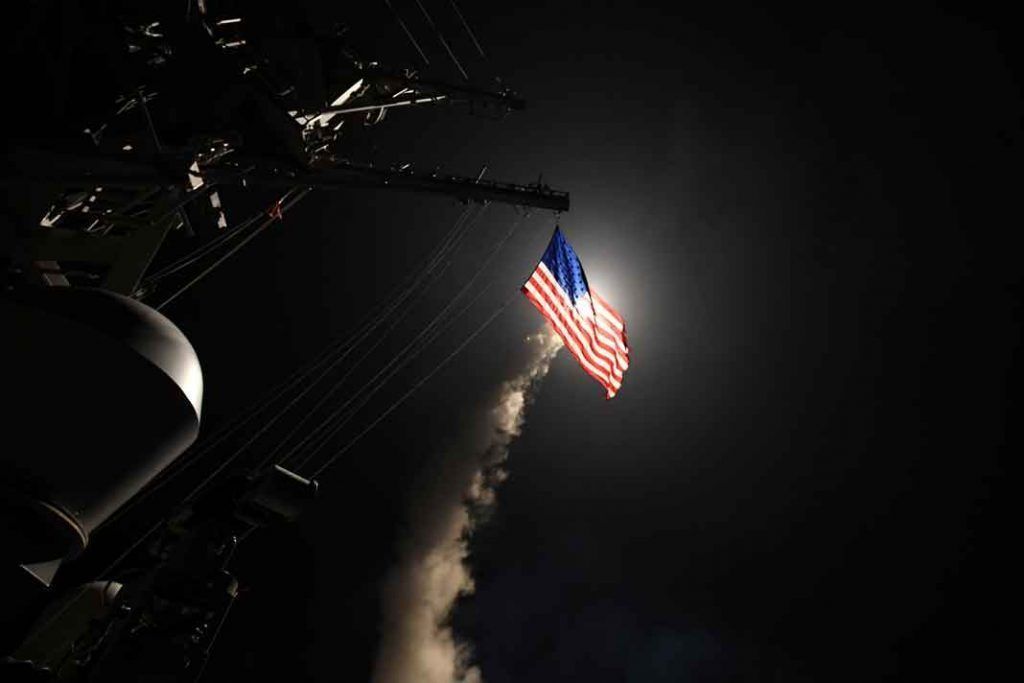April 07, 2017
Unexpected U.S. missile strikes against a Syrian airbase from which a suspected chemical weapons attack on a rebel-held town in northern Syria earlier this week killed at least 70 people has generated widespread and contradictory reaction around the world.

While Iran’s foreign ministry denounced the U.S. strikes and Russia said the move will hurt Moscow-Washington ties, European leaders have generally reacted positively to Washington’s move. Egypt called on all side to avoid the expansion of the conflict but Jordan supported the attack.
Syrian opposition groups welcomed the U.S. air strikes but said one single attack was not enough, calling on the Trump administration to increase its attacks on Syrian targets.
Iran’s reaction came through foreign ministry spokesman Bahrah Qasemi who said, “Iran … condemns use of chemical weapons … but at the same time believes it is dangerous, destructive and a violation of international laws to use it as an excuse to take unilateral actions.”
Iran, he said, “strongly condemns any such unilateral strikes… Such measures will strengthen terrorists in Syria … and will complicate the situation in Syria and the region.”
In Moscow, a spokesman for Russian President Vladimir Putin said the strikes had seriously damaged ties between Washington and Moscow. Putin regarded the U.S. action as “aggression against a sovereign nation” on a “made-up pretext”, spokesman Dmitry Peskov said.
Russian television showed craters and rubble at the site of the airbase and said nine aircraft had been destroyed.
France, meanwhile, said on Friday it had been informed by the United States before the U.S. military strikes on Syrian military positions and that Russia should use this “warning” to push for a political solution to the Syrian conflict.
France, a key backer of rebels opposed to President Bashar al-Assad, has repeatedly called on him to step down and this week said a suspected chemical attack by Assad’s forces was a test for U.S. President Donald Trump.
“The United States has started clarifying its position because over the last few days we heard one thing and then another,” Foreign Minister Jean-Marc Ayrault told Reuters and France Info radio in the Mauritanian capital, Nouakchott, where he was on a diplomatic visit.
“Here, we have an action that is a sort of condemnation, through military strikes on a military base, of what this criminal regime is doing.”
In Paris, President Francois Hollande confirmed French backing for the U.S. action, saying France had been seeking U.S. missile strikes in 2013 after a previous chemical attack.
Assad bore “full responsibility for this development,” Hollande said in a joint statement with Germany from the Elysee after speaking with Chancellor Angela Merkel.
Ayrault, who was informed ahead of the strikes by U.S. Secretary of State Rex Tillerson, said he did not believe Washington wanted to continue its strikes and that the escalation of the U.S. military role in Syria, in which two U.S. warships fired dozens of cruise missiles at an Assad-controlled airbase, was a “warning.”
“We are not seeking any confrontation, but Russia and Iran must understand that backing the Assad regime makes no sense,” he said, urging Moscow to now fully back a UN Security Council resolution that sets out the path for a transition to peace in the country.
“Peace negotiations (are going on) for a political transition, to rebuild the country and enable the return of refugees and that will not happen with Bashar al-Assad,” he said.
“I will tell the Russians: ‘Stop playing. Stop hesitating and pretending. Play your role and implement resolution 2254 (the UN resolution that sets out a roadmap for peace talks).”
Donald Tusk, the chairman of EU leaders, added his support, saying in a Twitter message: “US strikes show needed resolve against barbaric chemical attacks. EU will work with the US to end brutality in Syria.”
The head of the bloc’s executive European Commission said he “understood” efforts to deter any more chemical attacks.
“The US has informed the EU that these strikes were limited and seek to deter further chemical weapons atrocities,” Jean-Claude Juncker said in a statement. “The repeated use of such weapons must be answered.
“There is a clear distinction between air strikes on military targets and the use of chemical weapons against civilians.”
The European Union supports Syrian opposition and some moderate rebels negotiating in U.N.-mediated talks with representatives of Damascus, which in turn has the political and military backing of Russia and Iran.
In Cairo, a foreign ministry statement said, “Egypt calls on the United States and Russia to move effectively on the basis of international legitimacy resolutions, and the capabilities of both countries, to contain the conflict and reach a comprehensive and final solution to the Syrian crisis.”
Jordan, meanwhile, said the strike was a “necessary and appropriate response” to a chemical weapons attack this week which the United States and its allies have blamed on the Syrian government.
The talks have long been stalled and the war, which is in its seventh year, has killed more than 400,000 people, displaced millions inside Syria and set off a wave of refugees seeking shelter in neighbouring countries as well as the EU.
(This report is a compilation of a number of dispatches from Reuters.)








